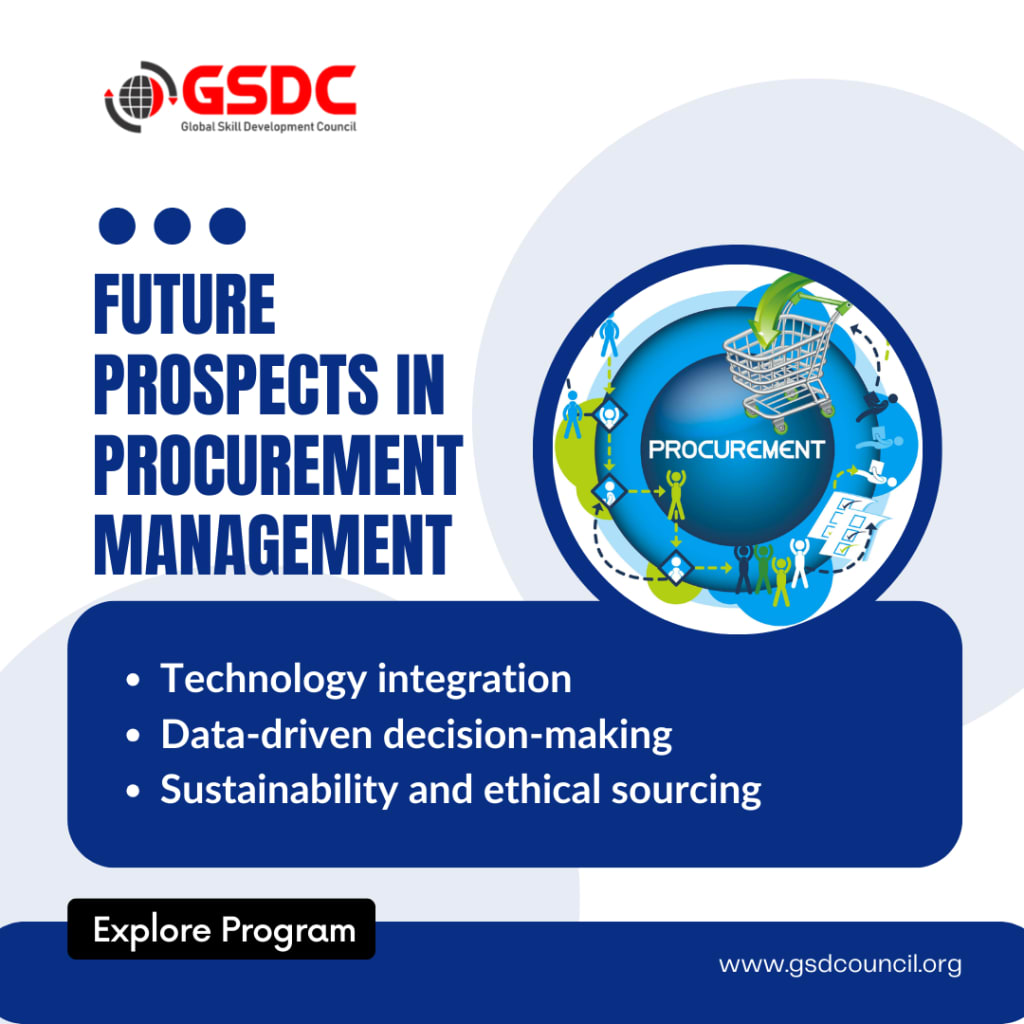Future Prospects in Procurement Management
Embracing procurement certification reflects a commitment to excellence and continuous improvement in procurement practice.

Procurement Certification is a credential that recognizes individuals who have demonstrated a high level of knowledge, skills, and expertise in the field of procurement and supply chain management. It is designed to validate the competency and professionalism of procurement professionals and enhance their career prospects.
Here’s an explanation of the future prospects in procurement management, focusing on technology integration, data-driven decision-making, and sustainability and ethical sourcing:
1. Technology Integration
Technology integration refers to the adoption and implementation of advanced technologies to streamline and enhance procurement processes. This includes tools such as artificial intelligence (AI), robotic process automation (RPA), blockchain, and the Internet of Things (IoT).
Future Prospects:
Automation of Routine Tasks: AI and RPA can automate repetitive tasks such as invoice processing, order placement, and supplier communications, freeing up procurement professionals to focus on strategic activities.
Enhanced Data Accuracy: Advanced technologies can reduce errors in data entry and improve the accuracy of procurement records, leading to better decision-making and compliance.
Blockchain for Transparency: Blockchain technology can provide a secure and transparent ledger for tracking the origin and movement of goods, enhancing traceability and reducing fraud.
IoT for Real-Time Monitoring: IoT devices can provide real-time data on inventory levels, shipment status, and equipment conditions, enabling proactive decision-making and reducing disruptions in the supply chain.
Enhanced Collaboration: Cloud-based procurement platforms facilitate better collaboration between procurement teams, suppliers, and other stakeholders, improving efficiency and communication.
2. Data-Driven Decision-Making
Data-driven decision-making involves using data analytics and business intelligence tools to inform and optimize procurement strategies and decisions. This approach leverages historical data, predictive analytics, and real-time information to make more informed choices.
Future Prospects:
Predictive Analytics: By analyzing historical data and market trends, procurement professionals can predict future demand, identify potential risks, and optimize inventory levels.
Spend Analytics: Advanced analytics tools can provide deeper insights into spending patterns, helping organizations identify cost-saving opportunities and optimize procurement strategies.
Supplier Performance Management: Data analytics can track and assess supplier performance against key performance indicators (KPIs), enabling better supplier selection and management.
Risk Management: Data-driven approaches can identify and quantify risks related to supplier reliability, market volatility, and geopolitical factors, allowing organizations to develop more robust risk mitigation strategies.
Strategic Sourcing: Analytics can help identify the best sourcing options by evaluating total cost of ownership, supplier capabilities, and market conditions, leading to more strategic procurement decisions.
3. Sustainability and Ethical Sourcing
Sustainability and ethical sourcing involve procuring goods and services in a way that considers environmental, social, and ethical impacts. This approach prioritizes the use of sustainable resources, fair labor practices, and reducing the carbon footprint.
Future Prospects:
Regulatory Compliance: Increasing regulations and standards related to sustainability and ethical sourcing will require organizations to adopt more sustainable practices to comply with legal requirements.
Consumer Demand: Growing consumer awareness and demand for ethically sourced and sustainable products will drive organizations to prioritize these aspects in their procurement strategies.
Supplier Collaboration: Organizations will increasingly collaborate with suppliers to improve sustainability practices throughout the supply chain, such as reducing waste, minimizing emissions, and ensuring fair labor practices.
Sustainable Innovation: Procurement professionals will focus on sourcing innovative, sustainable materials and technologies that reduce environmental impact and promote circular economy principles.
Brand Reputation: Adopting sustainable and ethical sourcing practices can enhance an organization’s brand reputation, attract socially conscious customers, and differentiate the company in the marketplace.
The future of procurement management is poised for significant transformation driven by technology integration, data-driven decision-making, and a strong focus on sustainability and ethical sourcing. By embracing these trends, procurement professionals can enhance efficiency, optimize strategies, and align procurement practices with broader organizational goals and societal expectations. This forward-thinking approach will not only drive value and innovation but also ensure that procurement contributes positively to the environment and society.
About the Creator
Enjoyed the story? Support the Creator.
Subscribe for free to receive all their stories in your feed. You could also pledge your support or give them a one-off tip, letting them know you appreciate their work.





Comments
There are no comments for this story
Be the first to respond and start the conversation.